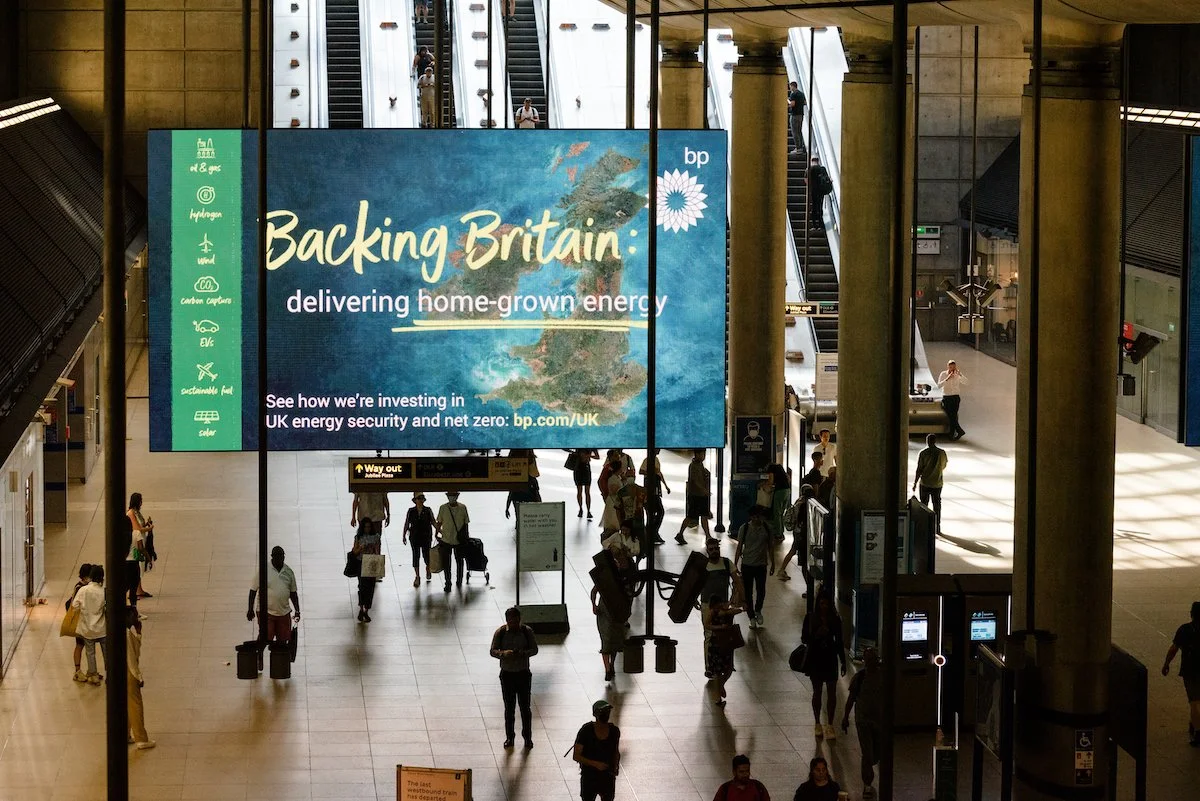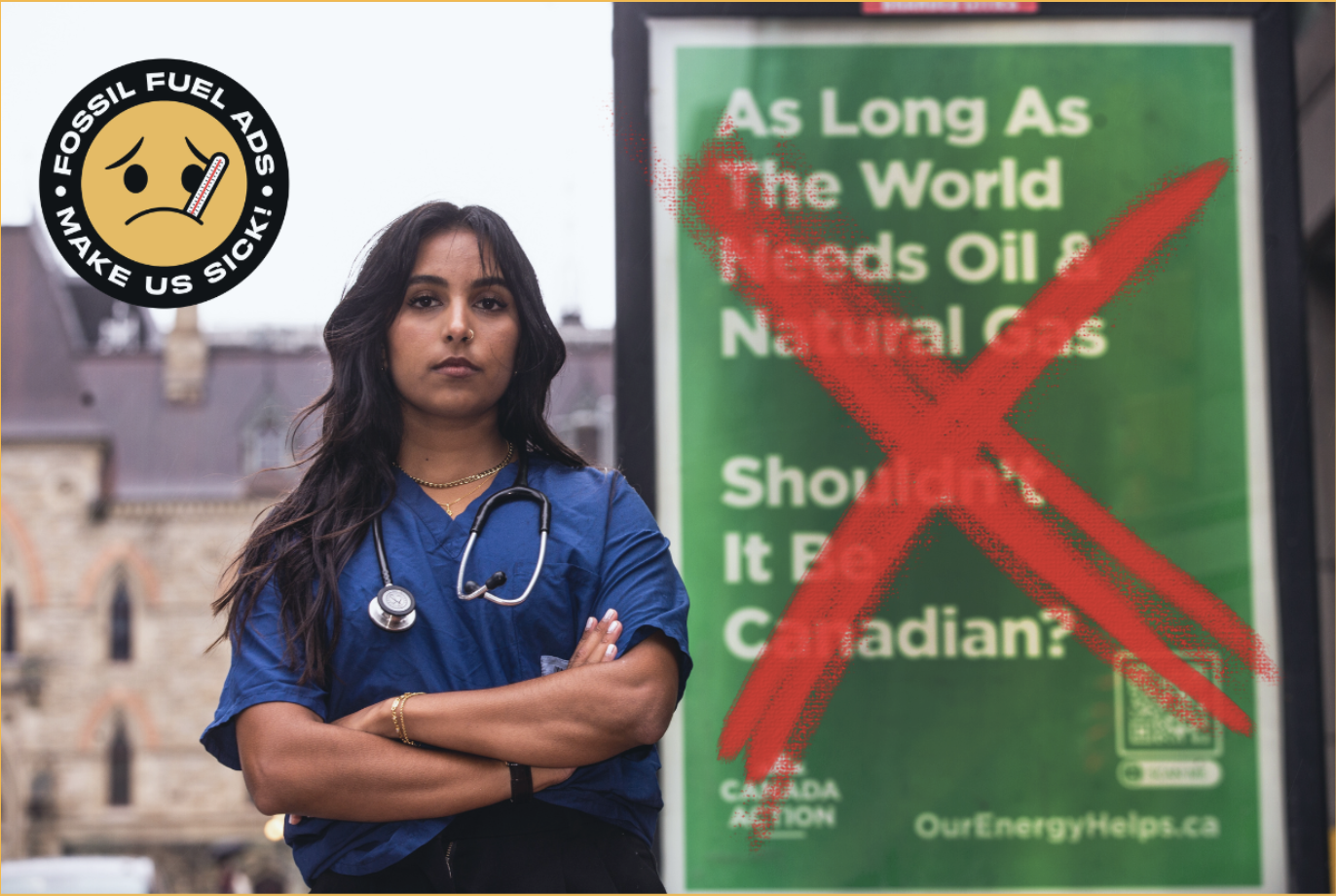TfL “lawfully entitled” to adopt Low-Carbon Ad Policy, say lawyers
New legal advice provides support to Transport for London (TfL) to restrict polluting advertising across the UK capital’s public transport network, which is one of the largest advertising estates in the world.
London Mayor Sadiq Kahn has prioritised reducing air pollution and climate action. However, currently, the transport network hosts hundreds of oil and gas adverts, as well as ads for goods and services that are heavily polluting, such as airline flights and SUVs.
BP advert at Canary Wharf tube station, 2022. Image creed: Fossil Free London
The advice was commissioned by the New Weather Institute and Adfree Cities to explore TfL’s scope for further action on harmful advertising following broad precedents on tobacco, sexist and junk food ads. The potential policy action is an opportunity for TfL to improve public health and reduce emissions in line with publicly stated goals.
The legal advice, written by Jonathan Moffett KC and Hannah Slarks at 11KBW Chambers, also finds that a current lack of national-level guidance on what constitutes ‘high-carbon advertising’ should not be an obstacle to TfL adopting a low-carbon advertising policy.
TfL has an existing advertising policy which already includes ‘high level principles’ for advertising that should be restricted on the network, such as that for food or drink high in fat, salt or sugar (HFSS products).
The new advice provides strong support for TfL to introduce additional restrictions on high-carbon advertising under its duty to mitigate climate change, saying that the likelihood of any legal challenge to such a policy being successful is low.
This comes just weeks after a legal challenge to The Hague’s new law against polluting adverts, was rejected. The court in The Hague ruled that the municipality's ban on advertising for fossil fuels, flight holidays, flight tickets, cruises and fossil and hybrid cars was lawful, stating: “After all, the Municipality has sufficiently substantiated that the advertising ban, within the limits of its legal authority, can contribute to countering the effects of climate change and to improving the health of the residents and visitors of The Hague."
Campaigners celebrate The Hague court ruling. Image credit: Reclame Fossielvrij
According to the new legal advice to TfL, both the transport body and the Mayor already have broad powers to reject advertising considered harmful or in contradiction to policy. It is very likely that the London Mayor has the power to direct the transport network to adopt a low-carbon advertising policy. Previous legal advice to the Mayor for TfL’s successful ban on advertising for unhealthy food was that he may use his power under the 1999 Greater London Authority Act to direct TfL about “the manner in which TfL uses its advertising estate”. The current Mayor, Sadiq Khan, has prioritised clean air and climate action in much of his policymaking since he was elected in 2016.
Separate legal advice for local councils, commissioned by the New Weather Institute in 2023, supports councils in the adoption of Low Carbon Advertising Policies in line with anti-pollution goals, and emphasises that councils have broad scope to design such policies according to their discretion.
Landmark policies introduced by UK councils including Edinburgh and Sheffield have already restricted advertising by sectors that are well-evidenced to cause high levels of pollution, for example, ads for airline flights, petrol and diesel vehicles, SUVs and fossil fuel companies.
While over two-thirds of UK adults (68%) would support restrictions on advertising that makes the climate emergency worse, recent global polling found that 89% of people want more action to fight the climate crisis. In 2024, the UN Secretary General, António Guterres, called for a worldwide ban on fossil fuel advertising.
As well as strong public support, there is a firm legislative foundation for local authorities and transport operators to adopt restrictions on high-carbon advertising, because the need to reach net zero carbon emissions is part of the UK’s primary legislation.
The London Mayor adopted a commitment that London will be net zero in terms of carbon emissions by 2030, providing extra motivation to reduce emissions by ending the active promotion of heavily polluting products and lifestyles on TfL. Also, under the 1999 Act, the Mayor and the London Assembly, “are each under a duty to address climate change, so far as relating to Greater London”.
Crucially, the advice finds that the removing adverts that promote polluting products and activities would not constitute an interference with the advertiser’s right to freedom of expression under Article 10(1) of the European Convention on Human Rights, since this would be justified under Article 10(2), which says that restrictions are justified in line with democratically agreed laws and, amongst other reasons, to protect public safety and health.
Image from the Fossil Fuel Ads Make Us Sick campaign, Canada. Credit: Canadian Association of Physicians for the Environment.
Legal Advice Conclusion Extract (p33-34)
J.CONCLUSION
101. We [Jonathan Moffett KC and Hannah Slarks at 11KBW Chambers] have been asked to address two specific questions. Those questions, and our answers to them, are as follows.
(1) What are any potential legal consequences for TfL of implementing a low-carbon advertising policy? Although it is certainly possible that, should TfL adopt a low-carbon advertising policy, it would face a legal challenge to that policy, for the reasons set out above we consider that, in general terms, such a challenge would be unlikely to succeed.
(2) Does TfL have a broad scope to design a low-carbon advertising policy using their own discretion and properly-evidenced rationale for excluding certain categories, despite a lack of national definition of ‘high carbon advertising’?
Our answer is “yes”.
Our thanks to Jonathan Moffett KC and Hannah Slarks at 11KBW Chambers for their work to produce this legal advice, which can be read in full here.



